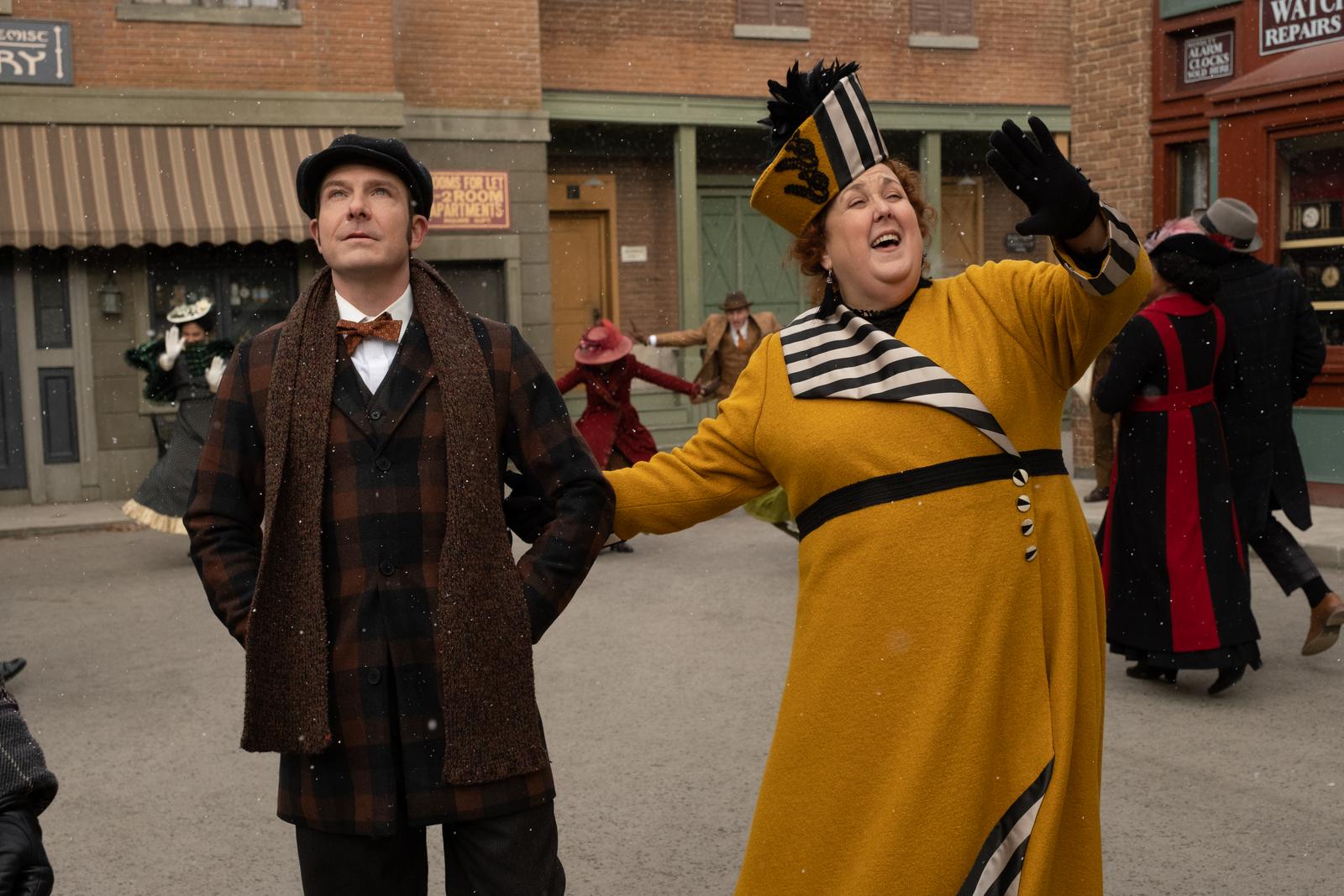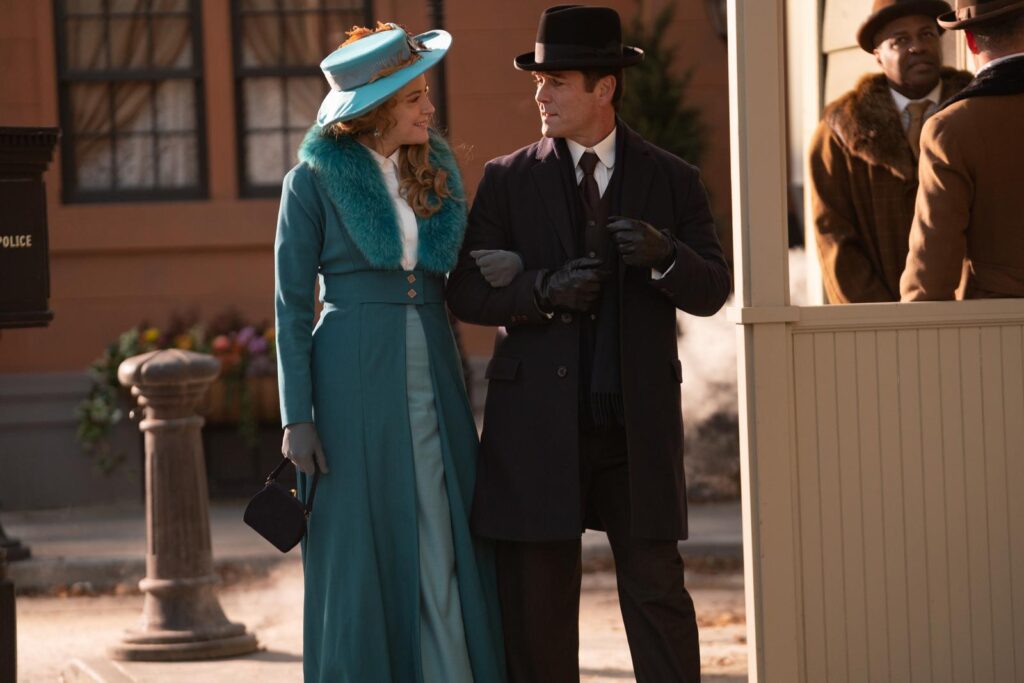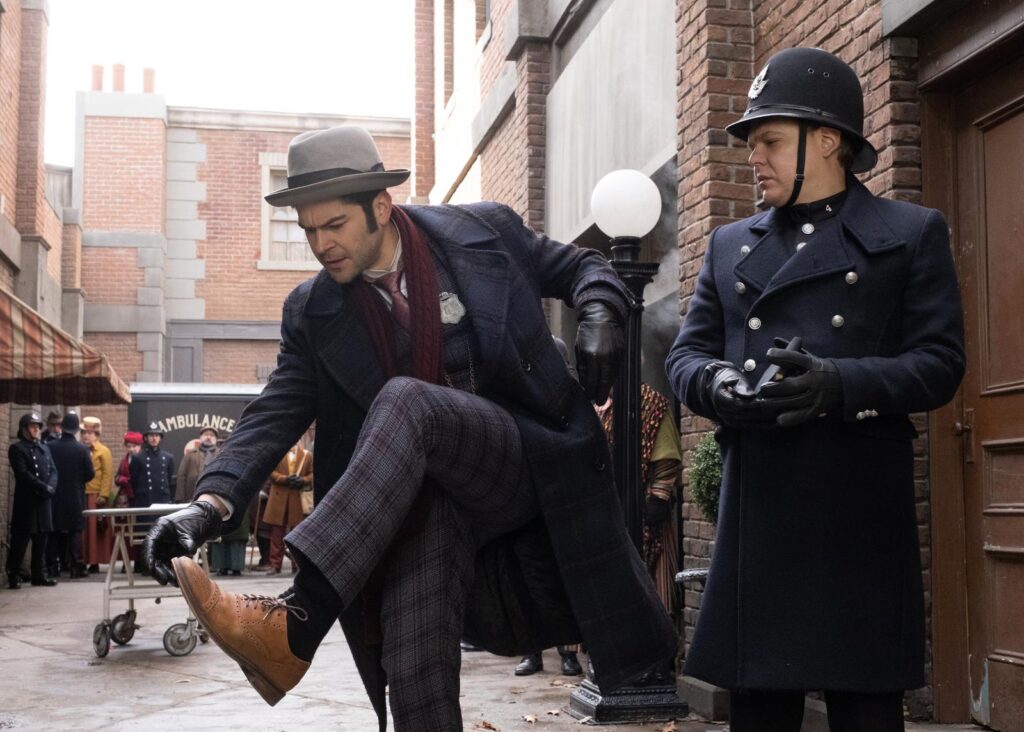
Lachlan Murdoch & Sharron Matthews
I had been hoping to find a legitimate reason to write about the CBC television series Murdoch Mysteries for ages now, since reviewing a random episode of show in its seventeenth season seems a bit strange. The excuse they have given now, however, was almost unfurled to me on a silver platter: episode twenty-two of the seventeenth season is called “Why Is Everybody Singing” and it’s a musical.
The genre of Murdoch Mysteries is sometimes called a “cozy mystery,” so called I think because even though there is almost always at least one murder in every episode, the violence exists within a well-established structure that becomes familiar to avid viewers, and they know, no matter how harrowing a situation these characters might find themselves in, the mystery will be solved in a way that feels both clever and satisfying at the end. Over the past ten years or so that is what Murdoch Mysteries has been for me: a cozy anchor for my Anxiety. I have re-watched the entire series at least three times, and I watch all the Christmas specials every year. The show is set in Toronto and filmed on location there and throughout Southern Ontario, and it has been very akin to the Law and Order franchise, filmed in New York, which employs a lot of Broadway actors, on Murdoch Mysteries a lot of the guest stars are stage actors who work primarily in Toronto and/or at the Stratford and Shaw Festivals. In this way the coziness factor for me also extends to getting to have brief, albeit usually somewhat odd, little visits with old friends from time to time too.
It was the three-layered conceit of Murdoch Mysteries that first got me hooked on the series. The story of the show begins in 1895 and it is now oscillating a bit between 1911 and 1912. It is based on a novel series written by Maureen Jennings that was first published in 1997, telling the story of Detective William Murdoch of the Toronto Constabulary who uses his mathematically-wired brain and his passion for science and technology to solve crimes at the turn of the Twentieth Century. The creators of Murdoch Mysteries excel in creating scenarios drawn from both factual historic events that took place in or around Toronto in the specific timeline of each season, and also coming up with these new and interesting ways to use real scientific theories, advancements, and interests of Murdoch’s to help solve each mystery in a unique but also a logical way. The set and locations that are chosen for filming really gives the viewer a snapshot of what Toronto looked like one hundred years ago. Obviously, in both the history and the science poetic license is sometimes involved, but the show is rooted in a world, and main characters, that feel plausible. This, I’m sure is a big part of the secret to the show’s success, which keeps fans coming back to see how Murdoch and the gang will solve the mystery this week, even after almost three hundred episodes.
For this musical episode writer Paul Aitken had to find a way to ground this idea too in some kind of logical, scientific concept. The conceit of this episode is very clever, and adds singing and dancing as just another element on top of writing an episode with a narrative that belongs to the overall arc of the season and the show as a whole, as well as keeping the musical in the proper timeframe, and bringing in science, not just to justify the musical, but also to solve the mystery.
Here, Detective Murdoch suffers a brain injury after being shot in the head. He is in a coma and the bullet has affected the musical part of his brain. The musical unfolds inside Murdoch’s mind as he imagines his colleagues and his wife, Dr. Julia Ogden, helping him to work out who shot him and why. We find out as the episode unfolds that he is hearing his wife and his fellow officers talking in his hospital room, and his brain is working them, and what they are saying, into his coma-dream, but his brain is then channelling all this information into songs.

There is some great detail work in Aitken’s script, as he plays with the idea that when the other characters are figments of Murdoch’s imagination, they do sound mostly like themselves, but they also sound a bit like Murdoch, as they are giving voice to his thoughts, his ideas, and his theories inside of his head. For example, there is a moment where Jonny Harris’ Constable George Crabtree, whose penchant for whimsical fancy as opposed to science has been well-established, explains a complicated theory to Murdoch, clarifying for us that we aren’t seeing the real George here, but rather just a conduit for Murdoch’s own reasoning. There is a very sweet and earnest moment between Harris and Yannick Bisson’s Murdoch later where George overtly reminds Murdoch that he is not, in fact, real.
Harris’ George Crabtree makes the most sense within this world as a character from a musical. There is inherently a sort of Music Man or On the Town quality to him: extremely charming, a little bit hapless, eternally optimistic. Director Laurie Lynd frames a lot of the big production numbers around Harris, as he becomes part of our gateway into this other dimension. Canadian musical theatre star Sharron Matthews also guest stars on this episode. She plays Maisy Mack, and she is the last person we see Murdoch see before he is shot and his life becomes a musical, which is a beautiful Canadian theatre Easter egg and bit of foreshadowing, as though Matthews herself turns any world she enters into a musical with something akin to the Midas touch.
The songs have lyrics by Paul Aitken and music by Robert Carli and they oscillate between production numbers that reminded me of classic musicals or even music hall songs that would have been accurate to the time, and then shorter musical interludes, the recitatives, which reminded me more of something from Les Misérables. The opening number “The World Keeps Getting Better” is very fun and catchy, similar in tone to “I’ve Got Everything In Front of Me” from The Muppets (2011), but also like “Fugue for Tinhorns” in Guys and Dolls, since it’s largely Constables Higgins and Crabtree discussing a story in the newspaper, establishing who and where they are moreso than contributing immediately to the plot.
Thomas Craig as Inspector Brackenreid has the big “Razzle Dazzle” number named after his signature catchphrase “Bloody Hell,” which includes some great dancing, choreographed by Tim French. Arwen Humphreys, always so endearingly smug as Margaret Brackenreid, has a really cute set-up for her husband’s song. Carli also does a beautiful job of interweaving the iconic Murdoch Mysteries theme throughout the episode.

Daniel Maslany plays Detective Llewellyn Watts, and, in general, I think his portrayal is one of the most imaginative and sophisticated portrayals of a character on Canadian television. Watts moves in a very specific way, there is a sort of Sherlock Holmes hound dog quality to him, he likes to stay low to the ground often, and moves with sweeping, often clumsy, and impulsive flourish, as though he is always being led by his nose, or some other instinct that pulls him as though from a hook. Watching Maslany translate this already very physical performance into dance and finding the way that Watts would move, is impressive. Maslany has a lovely voice and his duet with Shanice Banton’s Violet Hart, the coroner, who also has a gorgeous voice, makes for an excellent duet.
Even within Murdoch’s imagination the characters respond to their being in a musical largely as one might expect them to. Lachlan Murdoch’s Henry Higgins, who often just in general can’t be bothered, initially resists joining in on the production number happening around him, and Bisson’s William Murdoch rejects the entire premise happening in his mind as ridiculous, especially since it’s complicating the task of uncovering the identity of his would-be murderer. Yet, when his wife Julia, played by Hélène Joy, sings sweetly to him about how the culmination of their seventeen-seasons long love affair is their baby daughter Susannah, William begins to sing along with her in attempt to connect with her from his comatose state. The idea of William and Julia being in harmony with one another, regardless of their physical state, beyond any injury no matter how severe, and even despite what leap of faith logical William must take, really captures the overall heart of the series.
This is potentially a spoiler, so you may want to skip this paragraph if you haven’t seen the episode, It is a testament to Joanna Syrokomla and everyone in the Murdoch Mysteries costume department that, despite seeing in the opening credits that Colin Mochrie had a guest appearance on this episode, I didn’t recognize him at all until the moment of revelation when I was meant to realize who he was. It’s also a testament, of course, to Mochrie’s own talents. In an episode this short, and with so few cast members, this was a beautiful, and very rewarding feat. Mochrie plays a recurring character, Ralph Fellows, who is deliciously evil, but also a bit of a cartoon-like blockhead, which is all in great fun. Aptly, his song reminded me of Scar’s “Be Prepared” from The Lion King.
I caught a few Halifax theatre connections in this episode: Larry Mannell, who was in Gypsy at Neptune Theatre in 2001, and Ryan Brown, who was in Peter Pan there in 2019 are both background performers in this episode. Daniel Maslany has performed in the theatre in Halifax too, in 2b Theatre’s The Story of Mr. Wright in 2012. Then, of course, branching outward from Halifax a bit but staying in the region, both Jonny Harris, and his character George Crabtree, are from Newfoundland.
The entire cast of this episode does a great job of finding exactly who their characters would be inside of a musical, and walking a fine line between living in the world they have created over the last seventeen seasons on Murdoch, but also heightening that world into the genre of musical theatre. I think fans of the show will be able to make that leap with these characters, and escape into a world that is bright, delightful, and even more of a cozy mystery than usual.
You can buy or stream the cast album (so fancy) to “Why is Everybody Singing” on Spotify or Apple Music/iTunes, or wherever you get your music. You can watch Murdoch Mysteries for free and on demand on CBC Gem.






 World Theatre Day: My God Is It Ever The Time to Invest in Canadian Plays
World Theatre Day: My God Is It Ever The Time to Invest in Canadian Plays 